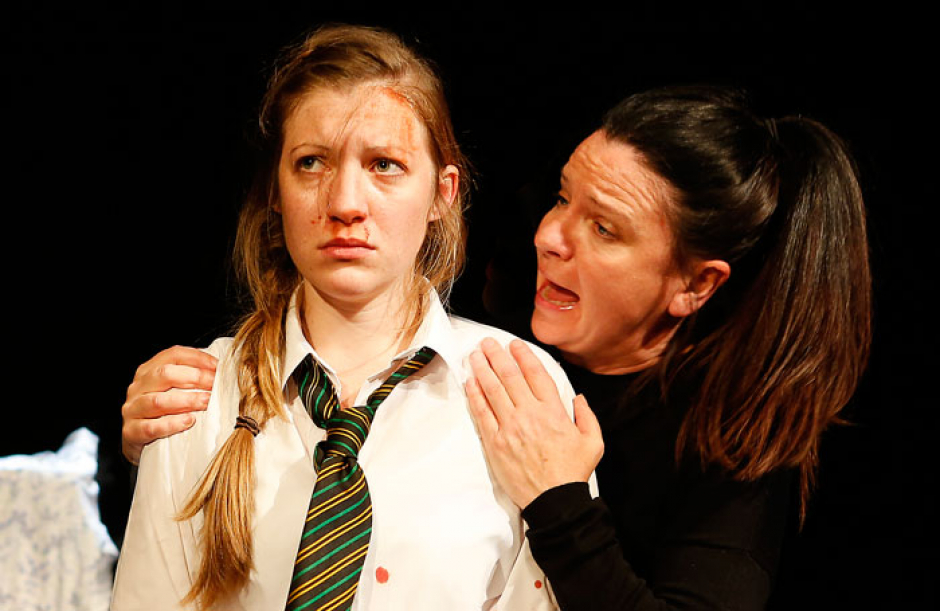Cathy, by Abi Taylor, directed by Adrian Jackson; The Royal Exchange, January 12 2017.
How do you solve the problem of homelessness? I know that’s not the kind of question you normally expect to be faced with when you head online to check out what shows you should be going to see in the next few days. But it’s an important question, and one we don’t seem to be asking often enough. Those of you readers who live in Manchester will be all too familiar with how the problem has grown in recent years. Fifty years ago, filmmaker Ken Loach saw a similar societal issue and decided to confront it using the medium he was most equipped to use. Cathy Come Home is still considered his best work and it had a pretty big effect back in 1966. A year after it came out the charity Crisis opened its doors and, almost solely because of the film, homelessness became a subject that was discussed everywhere from the living room to the House of Lords.
Loach was interviewed last year, and he said that as much as the film impacted upon people’s consciousness, it did very little to change the situation for those people who were living on the streets or struggling with their housing. Some fifty years later Loach, and many others, think we’re in a worse position than ever before.
So if a film that was watched by twelve million people on its first broadcast wasn’t able to make a particularly long-lasting difference, then you might wonder how a small play can expect to do any better. Arguably, they can’t. But on the evidence of Cathy, the amazing team at Cardboard Citizens Theatre Company are going to give it a bloody good try.
Let’s start with the play. Billed as a modern day update of Cathy Come Home, Cathy takes factual details from 2016 cases to show the brutality of policies and loopholes that are effecting the homeless in our current era. Cathy, played incredibly by Cathy Owen, is living in her home of ten years with her daughter Danielle, played by the equally impressive Hayley Wareham. Their landlord Jay pops around one evening to tell them that he has been sending letters in Cathy’s ex-husband’s name to inform them of their rent arrears, and as there has been no response he is now giving them less than a month to pay the £1800 that they owe. If they don’t pay up, they will have to leave.
Cathy is on a zero-hours contract, so the likelihood she’ll be able to pay is never realistic. And so begins a spiral that starts with her and Danielle moving to emergency accommodation in Luton and later sees them being offered a new home near Gateshead, relying on the reluctant favours of friends and family, spending time on the sofas of strangers they meet in pubs, and eventually separated, with Cathy at her lowest ebb. It’s an emotion-packed seventy-five minutes of theatre, made all the more difficult to bear because of how true to life it is. The tear-stained faces around the room were all that was needed to show that Cathy has all the power of its much-admired predecessor.
But Cardboard Citizens were not stopping there. Following the play they invited us all to take part in what they called a forum theatre, where they took a few specific scenes from the show and replayed them, encouraging audiences members to shout stop when they thought Cathy could have done something different. The audience member would then come up to the stage and act out their alternative. More than anything, this innovative idea worked to show that around every corner there was another potential hazard. It showed that for people like the characters in this play, the problems can be insurmountable.
A play like this is never going to solve the crisis we are witnessing on its own, and nobody in their right mind would claim that it would. But from listening to some of the audience members during the forum, it was clear that Cathy could start a more widespread discussion. One audience-member even admitted that they had previously thought that homeless people only had themselves to blame; in just seventy-five minutes, Cathy had convinced them otherwise. If it does the same to just a few people on each night of its tour, then we have the beginnings of a movement on our hands.
The night ended with the cast of the play taking down suggestions from the crowd, ideas for law and policy changes that might alleviate some of the difficulties. At the end of the tour they are going to take all these suggestions to the House of Lords. They should be applauded for these incredible efforts, and all the work they have done since forming twenty-five years ago. They should also be applauded for what was, even without all that surrounded it, a really top notch play. If you don’t manage to catch it in Manchester, then find out where else you can see it. And if you can’t make it at all, keep an eye out on their website. They will be live streaming in the coming weeks. You don’t want to miss it.

